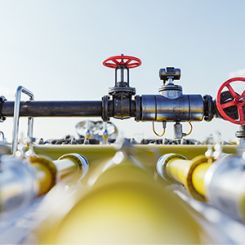VANCOUVER, Canada (Dec. 3, 2014) – GE Oil & Gas announced that LNG Canada Development Inc. has selected GE’s LMS100-PB dry low emission (DLE) aeroderivative gas turbine as well as vertically and horizontally split centrifugal compressor technologies for its proposed gas liquefaction plant for the export of liquefied natural gas (LNG) in Kitimat, British Columbia. The LMS100-PB is one of the largest aeroderivative gas turbine available with a free power turbine, making it ideal for large LNG applications. With its aviation heritage and the introduction of intercooling technology, the LMS100 offers high simple-cycle efficiency. The LMS100-PB is rated at 105 megawatts and 45 percent efficiency at ISO conditions. “The decision to power our facility with highly efficient natural gas turbines and compressors in combination with renewable electricity reflects our commitment to listen to and act on feedback from our stakeholders, when possible,” said Andy Calitz, CEO of LNG Canada Development Inc. “LNG Canada’s vision is to work collaboratively with First Nations, the local community and stakeholders to deliver a project that is safe, reliable and reflective of community interests.” LNG Canada has selected natural gas turbines for the liquefaction process to minimize fuel use and greenhouse gas emissions. LNG Canada also recently signed a power agreement with BC Hydro to use clean, renewable electricity from BC Hydro for a portion of the electricity needed for the facility. LNG Canada estimates that the proposed facility will have a greenhouse gas emission intensity of about 0.15 ton CO2e/ton LNG produced, which is lower than benchmarks recently introduced by the B.C. government and among the lowest CO2-emitting LNG facilities in the world. While this announcement is an important step forward for the proposed LNG Canada project, LNG Canada must ensure the project is economically viable and meet several other significant milestones related to gas supply, engineering and cost estimates, supply of labor and regulatory approval prior to making a final investment decision. LNG Canada comprises Shell Canada Energy (50%), an affiliate of Royal Dutch Shell plc, and affiliates of PetroChina (20%), Korea Gas Corporation (15%) and Mitsubishi Corporation (15%). This operating entity is incorporated and registered under the federal laws of Canada. The joint venture is proposing to build an LNG export facility in Kitimat that initially consists of two LNG processing units referred to as “trains,” with an option to expand the project in the future to four trains. GE provides solutions in energy, health and home, transportation and finance. GE Oil & Gas provides advanced technology equipment and services for all segments of the oil and gas industry, from exploration and production to downstream.
Wed, 12/03/2014 - 00:00

